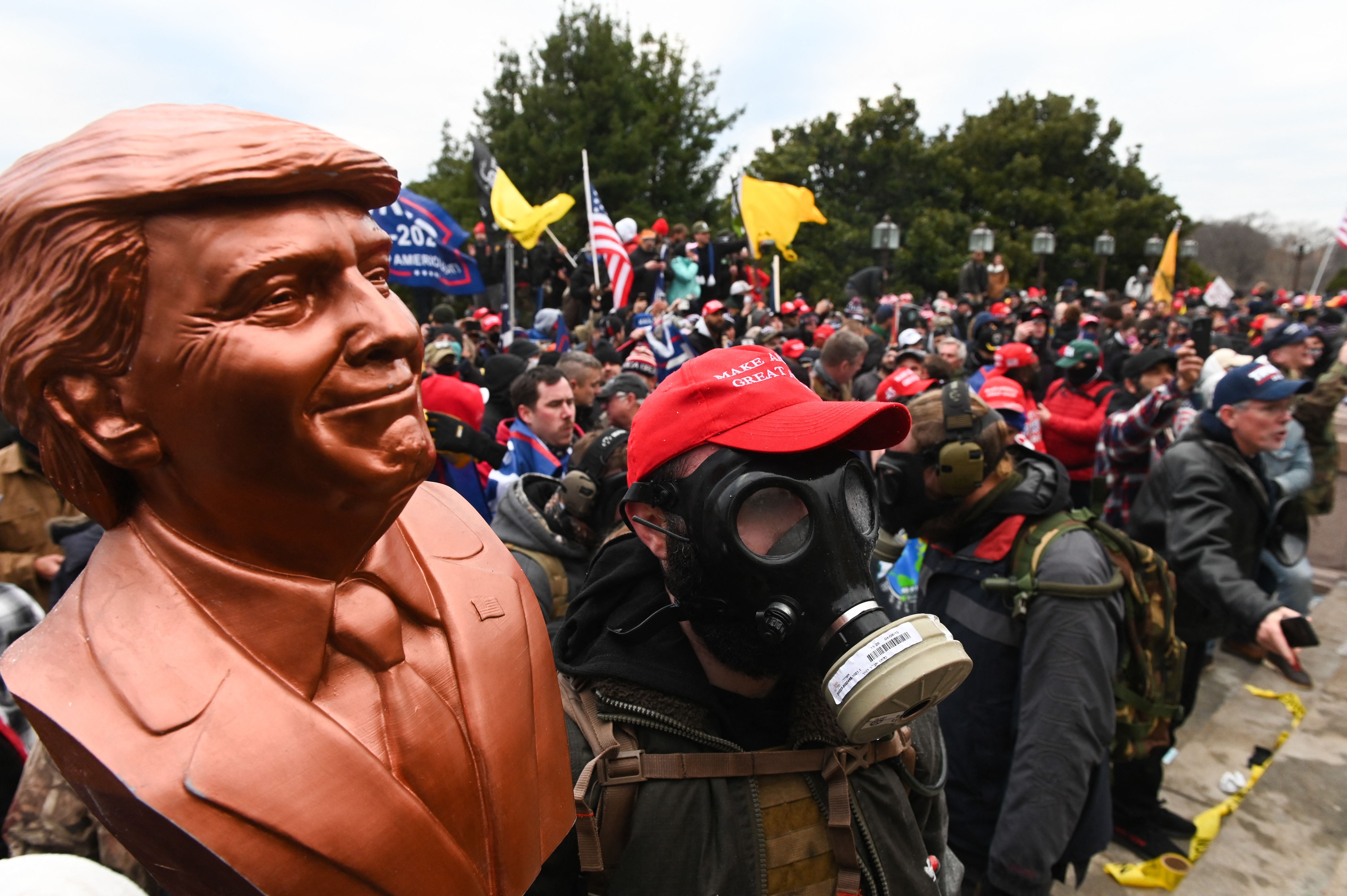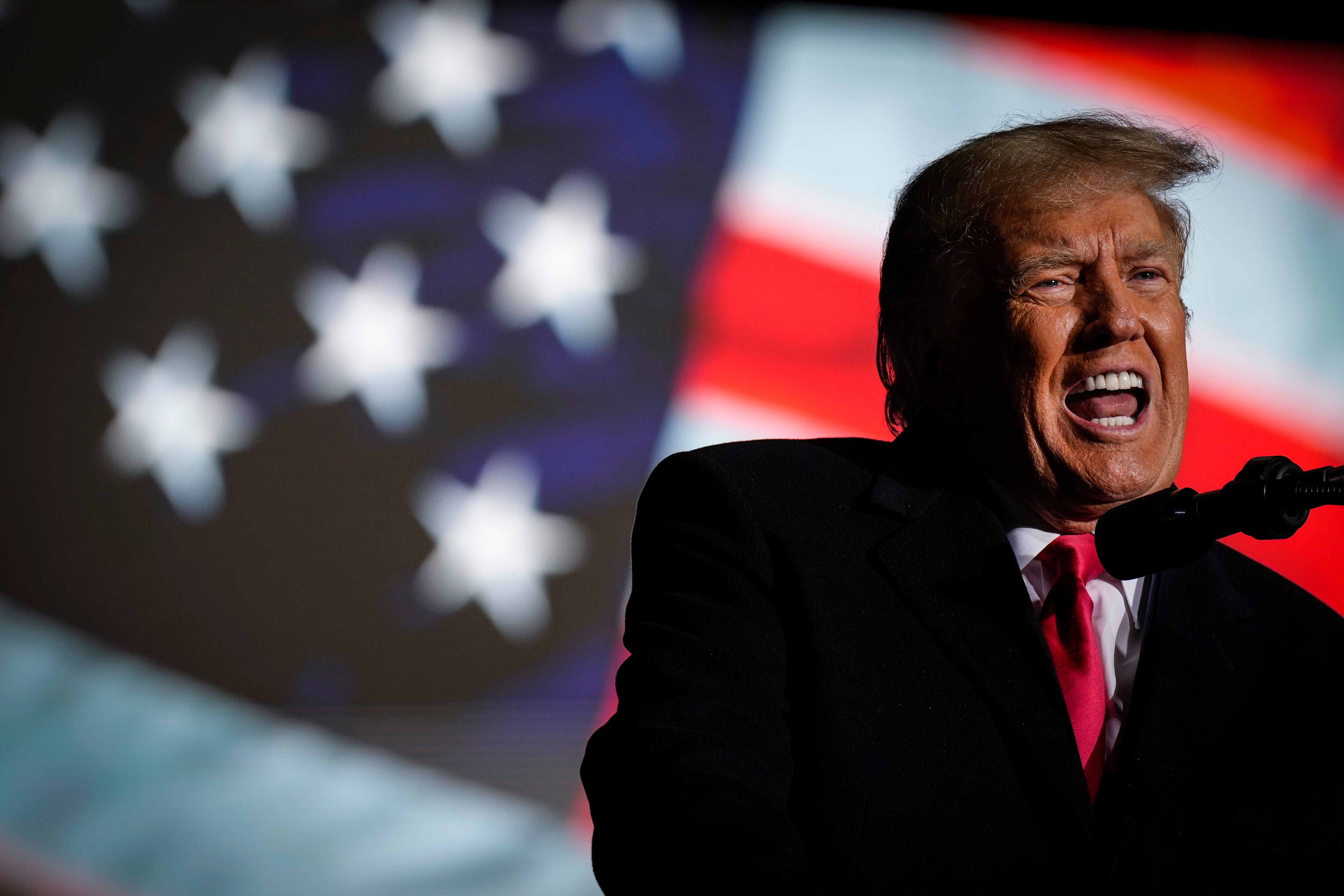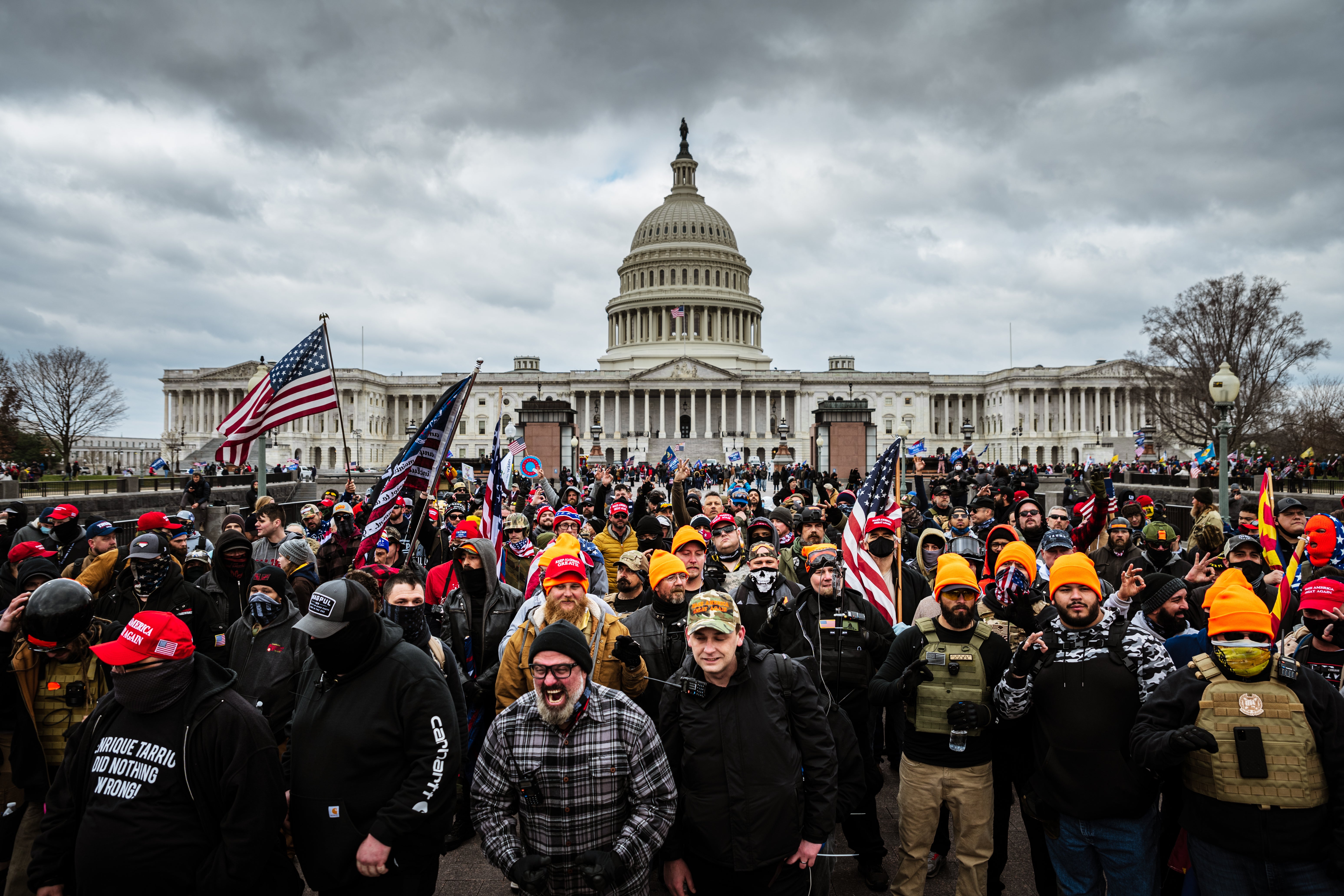Threats of armed occupations and lone-wolf terrorism: what might happen if Trump loses
As November 6 creeps closer, so too does the chance that Trump and his devout followers may lose. With election officials having suffered abuse for doing their jobs and memories of militant organisations storming the Capitol fresh in Americans’ minds, Alex Hannaford finds out how a Republican loss could ignite a dangerous string of events

“So, we’re going to see what some of our witnesses saw on January 6th,” announces Rep Bennie Thompson, the US congressman tasked with chairing the House select committee hearing into the riots that followed the election of President Joe Biden almost four years ago.
Thompson’s voice is measured, calm – the direct opposite of what’s about to transpire in the video footage he’s just introduced. The first images show a huge crowd of people, some waving union, confederate and Trump flags, moving towards the Capitol building in Washington, DC. Then they begin breaking down barricades. There are shouts of “take the building” and “f*** you, police”. An officer calls for help on a phone line: “We are still taking metal, sharpened objects, missiles … bottles and rocks and hand-thrown chemical grade fireworks.”
It’s the scenes from inside the Capitol building, of the rioters busting in – visceral, suffocating, devastating – that will likely be playing on the minds of potentially millions of Americans in the final run-up to 5 November, when they’ll cast their ballots for the next president of the United States. By early Wednesday morning, they may have discovered the victor. And if it’s Kamala Harris – if Trump loses that election – they’ll ask: what next? Will he deny the result again? He’s already building a case for “foreign interference” after accusing Keir Starmer’s Labour Party of election meddling. Will Republicans turn on voting booth administrators who call their states for the Democrats? Will Trump’s followers march on the Capitol again? Will they take up arms?

One person asking those questions knows only too well what it was like on 6 January – because he was there. Nick Quested is a British documentary maker who, in the lead-up to the attack on the US Capitol, was embedded with the Proud Boys for his film 64 Days, the far-right, neo-fascist militant organisation that was involved in the attack. Quested was making a film about the group – one he’s currently screening at cinemas across the US – and he was ultimately asked to testify under subpoena before Bennie Thompson’s January 6 committee about what he witnessed that day.
If Trump loses, Quested believes that in the days and weeks following the election, we’ll see Republican-aligned poll workers creating pretexts for protests and lawsuits; that we’ll see extensive pressure on election workers and elected officials – an “intense battering”, as he describes it, via social media. Quested believes we’ll see armed protests outside tabulation centres in swing states where residents have a right to openly carry firearms. And he believes we’ll see potential occupations of state capitols in those swing states.
“You’re going to start to see state legislators that refuse to certify elections and the electoral college,” he says. Quested says this will be the first time a new law – the Electoral Count Reform and Presidential Transition Improvement Act of 2022 – will be tested. Signed by Biden as a revision to an 1887 law, it was designed to prevent a repeat of the chaos that followed Trump’s refusal to concede the 2020 election, and the “fake electors plot” that was designed to overturn those election results. “This is the really important one because there is no case law surrounding the electoral count act,” Quested says, “… and this might percolate through the state courts, into the state appeals courts, into the federal appeals court, and then ultimately up to the Supreme Court.
What Quested doesn’t believe is that we’ll see a repeat of the attack on the Capitol. “I think they will harden that Capitol building in DC so it will look like Colditz by the time January 6 rolls around,” he says. “But state capitols? I think they are very soft targets because they are fundamentally the people’s houses and we’re meant to have free access to those buildings … Michigan has a large rural population and has an absolutist attitude towards the Second Amendment. And they have had a very serious incursion into the state capitol with armed protesters before.”
In 2020, hundreds of protestors, some of them wielding guns, rallied in Michigan’s capitol building against the state’s coronavirus lockdown. Others, outside, shouted: “This is the people’s house, you cannot lock us out.”
But Quested doesn’t think Trump will directly tell his faithful to storm the Bastille. “To me, he is like Henry II. He doesn’t say, ‘go and do this.’ He says, ‘who will fix this for me? Who will rid me of these meddlesome priests? Who will rid me of these meddlesome election officials?’”
It’s lone-wolf terrorism, but when they’re all coming out of exactly the same ecosystem, what do we call that?
Jon Lewis studies domestic terrorism and anti-government movements in his position as a research fellow at George Washington University’s Program on Extremism. If Trump loses this election, Lewis says no one should be surprised by what will happen. “We have seen the playbook already. We know what narratives will be presented to his base”, he says.
“We know it will feature anti-immigrant rhetoric; it will feature conspiracies that are inevitably quickly debunked. But the reality is that this is a post-truth landscape and these are conspiracies that tap into this deep emotive sense that the ‘enemy’ is trying to steal this country from them, trying to take everything that their largely white, largely Christian group thinks this country should look like. That’s a very powerful message and you can’t fact check your way out of that.”
Lewis expects to see these conspiracies pop up in swing states – inevitably, he says, featuring some thinly sourced story involving a non-white minority, missing ballots, and cries of fraud and theft. “None of this should be surprising because the foundation has been laid. The Stop the Steal movement has not gone away since January 7, 2021.”
Lewis says we still have this set of conspiracies that tap into the most racist, xenophobic, hateful ideas in America. And what Lewis fears is that this will be fuel to the fire for lone-actor violence. “The guy in Arizona who has no affiliation to any organised extremist group but who has been putting razor blades on the back of campaign signs or who has been sending white powder to his local Democratic campaign office because he’s convinced that they’re bussing in migrants to steal the election. Or the guy in Florida who is convinced that the FBI is out to get him, and who drives to a field office and tries to shoot it up.
“It’s lone-wolf terrorism, but when they’re all coming out of exactly the same ecosystem, what do we call that? When they’re all mobilised by the exact same pantheon of grievances, whether it’s an invasion at the border, whether it’s the Jews, whether it’s LGBTQ individuals, it all boils down to that core culture war, right?
“When you have this base of individuals across the country that have been fed these messages from influencers, grifters, YouTubers, from their members of Congress, or their local sheriffs … it’s only a matter of time before one of those guys who has some personal life issues, maybe some mental health issues, but easy access to firearms, wakes up on a Tuesday and says, ‘Hey, you know what? Enough is enough.’”
The most recent homeland threat assessment, published by the Department of Homeland Security at the end of September, said the agency was particularly concerned about violent extremist responses to domestic sociopolitical developments – “especially the 2024 election cycle.” Lone offenders and small groups, it said, “continue to pose the greatest threat of carrying out attacks with little to no warning.”

And today, that threat, Lewis says, has become far more localised. “You see many more threats to local judges, to local politicians, to these county-level election officials who don’t have secret service protection, who oftentimes volunteer and are simply getting death threats because they’re doing their job.”
The most recent annual survey by the Brennan Center for Justice, a nonpartisan law and policy institute, found that 38 per cent of local election officials experienced threats, harassment, or abuse for doing their jobs.
As for the Biden administration or congressional Democrats rising to the challenge of addressing these issues over the last four years – to counter the rising threat of domestic terrorism of fascism – Lewis says there has been little meaningful action. “We had the January 6 Committee which had its investigation, said Trump was bad, and we moved on. We didn’t really see meaningful policy changes around how we counter domestic terrorism, how we stop the rising white supremacist, anti-government mobilisation. Meanwhile, you have members of Congress who are still promoting the Great Replacement Theory [a harmful white supremacist conspiracy that falsely suggests immigrants, Muslims, and others are systematically displacing white people in their “native” countries] and who are still saying the 2020 election was stolen. These are the people who are in positions of power, positions of authority.”
Initially, the Harris campaign strategy was to mock Trump and his allies as being “weird”. After November 5, if Trump loses, it could be a lot worse than that.





Join our commenting forum
Join thought-provoking conversations, follow other Independent readers and see their replies
Comments